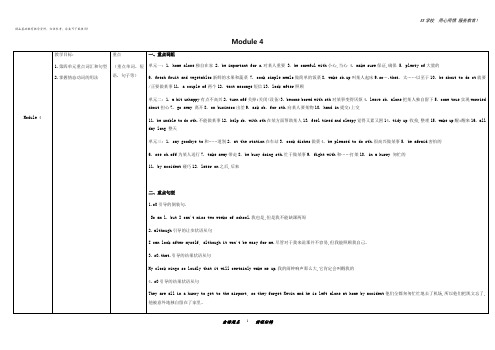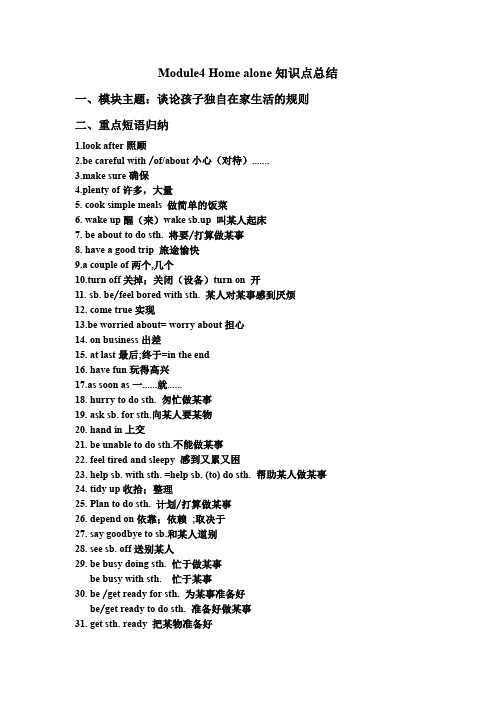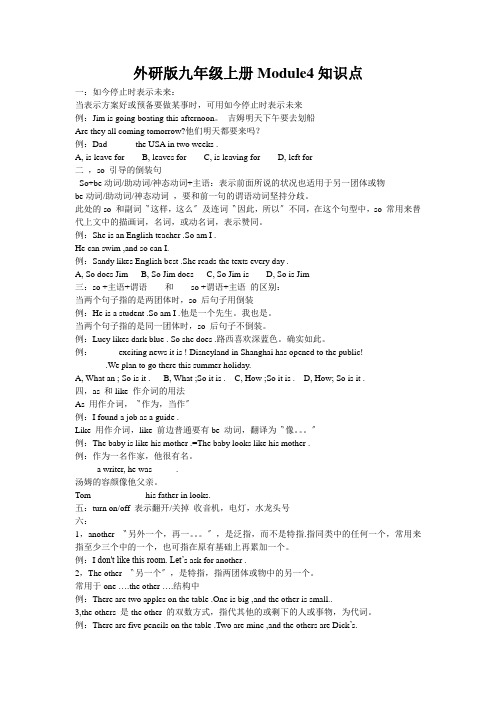外研版九年级上册Module4知识点
外研版九年级上册Module4知识点与练习(有答案)

Module 4 Home alone【重点详解】1. So am I. 我也是(很遗憾)。
【考点】so的用法。
语.”结构。
例:Mary isn't outgoing. Neither am I. 玛丽不外向,我也不(外向)。
典例精讲:—I have changed my job. —________.(贵州黔西南州) 【B】A. So do IB. So have IC. So I doD. So I have2. miss /mɪs/ v.未出席,未出现例: The teacher was very angry because I missed three days of school this week.老师很生气因为我本周缺了三天的课。
【考点】miss作动词,意为“想念;错过;未击中;未出席;没见到;遗漏”。
例:The batter missed the ball. 击球员未击中球。
She got up late. That's why she missed the early bus.她起床晚了。
那就是她错过早班车的原因。
【拓展】missing作形容词,意为“丢失的;失踪的”。
例:The police are looking for the missing girl. 警察正在寻找失踪的女孩。
3. shut /ʃʌt/ v.关上;合上例:Shut the door, please. 请关上门。
【考点】shut 表示“关闭”,通常情况下可以和close互换,不包含“不让进入”的意思。
其过去式和过去分词为shut,可以作形容词,但不能放在名词前。
“shut up”常用在口语中,表示“住口,闭嘴”。
例:He shut his eyes. 他闭上了眼睛。
Mike was shut in the bedroom. 迈克被关在卧室里。
4. anybody /'eniˌbɒdi/ pron.任何人例:Anybody can understand this story. 任何人都能理解这个故事。
外研版九年级英语上册 Module 4 重点难点易错点整理

Whether you believe it or not, it is true.
4."no matter +疑问词"或"疑问词+后缀ever"
No matter what happened, he would not mind.
Whatever happened, he would not mind.
4.s0引导的结果状语从句
They are all in a hurry to get to the airport, so they forget Kevin and he is left alone at home by accident他们全都匆匆忙忙地去了机场,所以他们把凯文忘了,他被意外地独自留在了家里。
注意:no matter不能引导主语从句和宾语从句。
(错)No matter what you say is of no use now.
(对)Whatever you say is of no use now.
你现在说什么也没用了。(Whatever you say是主语从句)
(错)Prisoners have to eatno matter what they're given,
(3)so+ many(多) / few(少) +复数可数名词+that…
He has so many books that I can’t countthem.他有很多书,我数也数不清。
(4)so+ much(多) /little(少) +不可数名词+that…
There was so much food that we couldn’t eat it all.食物太多了,我们吃不完。
外研版九年级上册英语Module 4 Home alone知识点总结

初三英语上册(外研版)Module 4 Home alone知识点总结一、重点词汇·原文再现It’s leaving from Platform 2.它将在2号站台出发。
·基本用法1. platform n. 月台;站台。
如:Any train from this platform stops at Gatwick.从这一月台开出的火车都在盖特维克停。
2. platform n. 讲台。
如:Jane walked boldly up to the platform without faltering.简沉着大胆地走上讲台。
·原文再现The meeting in Lhasa is very important for us…在拉萨的会议对我们而言很重要……·基本用法meeting n. 会议;集会,at meeting意为“在会议上”。
如:Our meeting in Beijing was later than I expected.我们在北京的会面比我们预想的要晚。
I’m sorry Mr. Wang is at meeting now.很抱歉王先生正在开会。
have/hold a meeting 意为:开会The manager is having a meeting.经理正在开会。
·知识拓展--相关单词meet v. 遇见;满足(过去式:met 过去分词:met 现在分词:meeting 第三人称单数:meets)meet with. “遇到;碰到”强调偶然性;还常表示“遭遇;经历;遭到”。
I met with a childhood friend on the bus.我在汽车上遇到一个儿时的朋友。
They met with an accident on their way back.他们在回去的路上遇到车祸。
·原文再现Shut it when you’re in and l ock it when you go out.当你在家时要关好门,当你外出时要锁好门。
外研版九年级上册Module 4 Language in use知识点课件(共18张PPT)

Complete the passage with the correct form of the words in brackept3s0. ③
Last Sunday, Lucy (1) __s_a_i_d__ (say) goodbye to her parents at the station. She could not (2) __t_ra_v_e_l__ (travel) with them because she did not want to (3) ___m_i_s_s___ (miss) school. Lucy was sure that she would be fine at home alone. There (4) _w__as___ (be) so much food in the fridge that she certainly would not go hungry. She (5) ___k_n_e_w___ (know) how to cook some simple dishes. Three days later, when her parents (6) _re_t_u_rn_e_d___ (return), Lucy (7) ___w_a_s___ (be) very pleased to see them.
➢ 他的胳膊很长,以至于他几乎能碰到天花板了。 He had such long arms that he could almost touch the ceiling.
3.当单数名词前有形容词时,既可以用 so,也可 以用 such,但不定冠词的位置却有所不同。 ➢ 这是一次很重要的会议,你一定要参加。
[注意] although/though 不能与 but 同时出现
外研版初三英语上册Module 4 知识点讲义

Module4 Home alone知识点总结一、模块主题:谈论孩子独自在家生活的规则二、重点短语归纳1.look after照顾2.be careful with /of/about小心(对待).......3.make sure确保4.plenty of许多,大量5. cook simple meals 做简单的饭菜6. wake up醒(来)wake sb.up 叫某人起床7. be about to do sth. 将要/打算做某事8. have a good trip 旅途愉快9.a couple of两个,几个10.turn off关掉;关闭(设备)turn on 开11. sb. be/feel bored with sth. 某人对某事感到厌烦12. come true实现13.be worried about= worry about担心14. on business出差15. at last最后;终于=in the end16. have fun玩得高兴17.as soon as一......就......18. hurry to do sth. 匆忙做某事19. ask sb. for sth.向某人要某物20. hand in上交21. be unable to do sth.不能做某事22. feel tired and sleepy 感到又累又困23. help sb. with sth. =help sb. (to) do sth. 帮助某人做某事24. tidy up收拾;整理25. Plan to do sth. 计划/打算做某事26. depend on依靠;依赖;取决于27. say goodbye to sb.和某人道别28. see sb. off送别某人29. be busy doing sth. 忙于做某事be busy with sth. 忙于某事30. be /get ready for sth. 为某事准备好be/get ready to do sth. 准备好做某事31. get sth. ready 把某物准备好Eg.We must get dinner ready. The guests(客人)are coming.32. in a hurry 匆忙hurry up 赶快33. by accident= by chance 意外地,偶然地34. later on 以后,后来35. take away 拿走,带走36. in danger 处于危险中37. all day long整天38. point out 指出39. call the police 报警40. clean up 清理41. fight with 与……打架42、text message 短信三、知识点详解Unit 11、T27 to Lhasa. It’s leaving from Platform 2.--现在进行时表示将来:当表示计划好或准备要做某事时,可用现在进行时表示将来.eg:Jim is going boating this afternoon。
外研版九年级上册Module4知识点

外研版九年级上册Module4知识点一:如今停止时表示未来:当表示方案好或预备要做某事时,可用如今停止时表示未来例:Jim is going boating this afternoon。
吉姆明天下午要去划船Are they all coming tomorrow?他们明天都要来吗?例:Dad ______the USA in two weeks .A, is leave for B, leaves for C, is leaving for D, left for二,so 引导的倒装句So+be动词/助动词/神态动词+主语:表示前面所说的状况也适用于另一团体或物be动词/助动词/神态动词,要和前一句的谓语动词坚持分歧。
此处的so 和副词〝这样,这么〞及连词〝因此,所以〞不同,在这个句型中,so 常用来替代上文中的描画词,名词,或动名词,表示赞同。
例:She is an English teacher .So am I .He can swim ,and so can I.例:Sandy likes English best .She reads the texts every day .A, So does Jim B, So Jim does C, So Jim is D, So is Jim三:so +主语+谓语和so +谓语+主语的区别:当两个句子指的是两团体时,so 后句子用倒装例:He is a student .So am I .他是一个先生。
我也是。
当两个句子指的是同一团体时,so 后句子不倒装。
例:Lucy likes dark blue . So she does .路西喜欢深蓝色。
确实如此。
例:______exciting news it is ! Disneyland in Shanghai has opened to the public!_______.We plan to go there this summer holiday.A, What an ; So is it . B, What ;So it is . C, How ;So it is . D, How; So is it .四,as 和like 作介词的用法As 用作介词,〝作为,当作〞例:I found a job as a guide .Like 用作介词,like 前边普通要有be 动词,翻译为〝像。
外研版九年级英语 M4
兴贤教育九年级英语上册(M4,)Module 4Home alone必记词汇:meeting n. 会议shut v. 关上lock v. 锁上anybody 任何人ring v. 鸣响passenger n.乘客order n. 命令empty adj. 空的simple adj. 简单的unable adj. 不能做某事常考短语:look after 照顾be careful with 小心对待plenty of 许多,大量wake up 醒来a couple of 两个at last 最后hurry to so sth. 赶紧做某事ask sb. for sth. 向某人做某事unable to do sth. 不能做某事in the end 最后by accident 意外的see sb. off 给某人送行知识点1.【it is leaving from platform】现在进行时表将来。
Come, go, leave, arrive等表示位置移动的动词现在进行时表计划将要发生的事情2. 【So am I】我也是So + be动词/助动词/情态动词+ 主语Neither/Nor+ be动词/助动词/情态动词+ 主语3. 【make sure + that/of】确保,设法保证Make sure you eat plenty of fresh fruit and vegetables.4. 【advise sb. to do sth.】建议某人做某事,advise people to stay at home.5. 【be about to do sth.】即将/正在做某事You train is about to leave. 您的火车要开了。
6.【See you in a couple of weeks】两周之后再见。
7. 【Practise the piano】练钢琴8. 【Turn off the TV】关上电视,turn on 打开;turn up/down 调大,调小9. 【bored】感到无聊,厌烦的修饰人,boring 令人烦恼的,修饰物1o. 【my wish come ture】: wish, dream, plan等,不能接宾语。
外研版九年级英语上册Module4模块各单元知识点归纳
Unit 3 plan to do sth. 计划做某事 [来 say goodbye to sb. 向某人告别 be pleased人送行 be busy doing sth. 忙于做某事 get ready 准备好 fight with sb. 与某人争吵 in a hurry 匆忙 by accident 无意;偶然 later on 后来 take away 带走 wait for 等候 in danger 处于 危险之中 point out 指出 for example 例如 [ ①...so...that... …… 如此 …… 以至 于 …… ②So+倒装结构. …… 也如此。 ③...,although... 尽管 …… ,(但是 ) …… ④It is...for sb. to do sth. 对于某人来说做某事是 … …的。
nit 1 platform n. (供上下火车用的 )月台;站台 meeting n. 会议;集会 miss v.未出席;未出现 [来 shut v. 关上;合上 lock v. 锁;锁住 simple adj.简单的;容易的 [来 anybody pron. 任何人 clock n. 钟;时钟 ring v. 鸣响;发出铃声 passengern. 乘客;旅客 addressn. 地址 text n. 文本;正文 couple n. 一对;两个 be careful with 小心对待…… look after 照看 make sure 确保 plenty of 大量的 [ wake sb. up 叫醒某人 be about to do sth就. 要 /正要做某事 text message 短信 have a good trip 旅途愉快 a couple of 两个
Unit 2 managev. 管理;支配 unhappy adj. 不高兴的
外研版英语九年级上册 Module 4 Home alone 知识点整理复习
Module 4 Unit 11. look after照顾= take care oflook after well = take good care of2. train number 车次3. be leaving 现在进行时表将来(类似come, start , go 等)4. Platform Two 二站台(注意首字母大写)5. be important for sb 对某人很重要It’s important for sb to do sth对于某人来说做某事很重要6. ① So + be / 助动词/ 情态动词+ 主语.... 也是(前文为肯定情况)--- I like apples. ---- So does Tony. Tony 也喜欢苹果。
②So + 主语+ be / 助动词/ 情态动词的确如此(同意上述观点)--- I like apples. --- So you do. 你确实喜欢苹果。
③ Neither / Nor + be / 助动词/ 情态动词+ 主语.... 也不(前文为否定情况)--- I don’t like bananas. --- Neither / Nor does Tony. Tony 也不喜欢香蕉。
7. miss two weeks of school 缺席两周的课8. Will you remember everything (that) I’ve told you? 你能记得我告诉过你的所有事情吗?划线部分为定语从句,修饰everything。
其中定语从句省略了关系代词that9 .be careful with /of小心(对待).......10. make sure确保11. plenty of + 可数名词/ 不可数名词许多,大量12. cook simple meals 做简单的饭菜13. wake up醒;醒来(动副短语)14. There won’t be anybody to wake you up in the morning. 早晨没有人会叫你起床。
外研版英语九年级上册Module 4 重难点知识归纳总结
Module 4【重点单词】1.platform [ˈplætfɔ:m] n. (供上下火车用的)月台,站台2.meeting [ˈmi:tɪŋ] n. 会议,集会3.miss [mɪs] v. 未出席,未出现4.shut (shut, shut) [ʃʌt] v. 关上,合上5.lock [lɒk] v. 锁,锁住6.simple [ˈsɪmpl] adj. 简单的,容易的7.anybody [ˈenibɒdi] pron. 任何人8.clock [klɒk] n. 钟,时钟9.ring (rang, rung) [rɪŋ] v. 鸣响,发出铃声10.passenger [ˈpæsɪndʒə] n. 乘客,旅客11.address [əˈdres] n. 地址12.text [tekst] n. 文本,正文13.couple [ˈkʌpl] n. 一对,两个14.actually [ˈæktʃuəli] adv. 事实上15.manage [ˈmænɪdʒ] v. 管理,支配16.unhappy [ʌnˈhæpi] adj. 不高兴的17.order [ˈɔ:də] n. 命令,指示18.business [ˈbɪznəs] n. 工作19.sofa [ˈsəʊfə] n. (长)沙发20.snack [snæk] n. 点心,小吃21.midnight [ˈmɪdnaɪt] n. 午夜,子夜22.empty [ˈempti] adj. 空的23.unable [ʌnˈeɪbl] adj. 不能做某事的24.burn (burned/burnt, burned/burnt) [bɜ:n] v. (使)烧焦,(使)烤糊25.cup [kʌp] n. 杯子,一杯饮料26.task [tɑ:sk] n. 任务,工作【重点短语】1.look after 照顾;照看2. make sure 确信;确保3. plenty of 很多;大量的4. wake up醒来5. so... that... 如此……以至于……6. advise sb. to do sth. 建议某人做某事7. be about to将要,正打算;即将;就要8. send sb. sth./send sth. to sb. 送给某人某物9. at a meeting 在会议上10. a bit unhappy有点儿不开心e true 实现12.on business 出差13.hand in上交14.tidy up整理,收拾15. be able to能够……16. be busy doing... 忙于做……17. get ready准备好18. fight with用(某种武器)与(某人)交战;用(某种方式、手段)反对(某人)19. be in a hurry立刻20. later on以后;后来21. in danger在危险中22. point out 指出;指明23. be worried about 担心【重点句型】1. I can look after myself, although it won’t be easy for me.虽然对我来说并不容易,但我能照顾我自己。
- 1、下载文档前请自行甄别文档内容的完整性,平台不提供额外的编辑、内容补充、找答案等附加服务。
- 2、"仅部分预览"的文档,不可在线预览部分如存在完整性等问题,可反馈申请退款(可完整预览的文档不适用该条件!)。
- 3、如文档侵犯您的权益,请联系客服反馈,我们会尽快为您处理(人工客服工作时间:9:00-18:30)。
Module 4 知识点。
一:现在进行时表示将来:
当表示计划好或准备要做某事时,可用现在进行时表示将来
例:Jim is going boating this afternoon。
吉姆今天下午要去划船
Are they all coming tomorrow?他们明天都要来吗?
例:Dad ______the USA in two weeks .
A, is leave for B, leaves for C, is leaving for D, left for
二,so 引导的倒装句
So+be动词/助动词/情态动词+主语:表示前面所说的情况也适用于另一个人或物
be动词/助动词/情态动词,要和前一句的谓语动词保持一致。
此处的so 和副词“这样,这么”及连词“因此,所以”不同,在这个句型中,so 常用来代替上文中的形容词,名词,或动名词,表示赞同。
例:She is an English teacher .So am I .
He can swim ,and so can I.
例:Sandy likes English best .She reads the texts every day .
A, So does Jim B, So Jim does C, So Jim is D, So is Jim
三:so +主语+谓语和so +谓语+主语的区别:
当两个句子指的是两个人时,so 后句子用倒装
例:He is a student .So am I .他是一个学生。
我也是。
当两个句子指的是同一个人时,so 后句子不倒装。
例:Lucy likes dark blue . So she does .路西喜欢深蓝色。
确实如此。
例:______exciting news it is ! Disneyland in Shanghai has opened to the public!
_______.We plan to go there this summer holiday.
A, What an ; So is it . B, What ;So it is . C, How ;So it is . D, How; So is it .
四,as 和like 作介词的用法
As 用作介词,“作为,当作”
例:I found a job as a guide .
Like 用作介词,like 前边一般要有be 动词,翻译为“像。
”
例:The baby is like his mother .=The baby looks like his mother .
例:作为一名作家,他很有名。
_____a writer, he was _____.
汤姆的相貌像他父亲。
Tom _____ ______ his father in looks.
五:turn on/off 表示打开/关掉收音机,电灯,水龙头等
六:
1,another “另外一个,再一。
”,是泛指,而不是特指.指同类中的任何一个,常用来指至少三个中的一个,也可指在原有基础上再累加一个。
例:I don't like this room. Let’s ask for another .
2,The other “另一个”,是特指,指两个人或物中的另一个。
常用于one ….the other ….结构中
例:There are two apples on the table .One is big ,and the other is small..
3,the others 是the other 的复数形式,指代其余的或剩下的人或事物,为代词。
例:There are five pencils on the table .Two are mine ,and the others are Dick’s.
I went swimming while the others played tennis .
4,other “其他的,另外的,别的”,后面接名词复数,表示泛指
例:Did you see any other films ?
5, others 泛指其他的,另外的或别的人或事物,常用于some …others …结构中。
例:some people came by car ,and others came on foot .
例:Ann is here ,but ______girls are still in the playground.
He finished his sandwich and asked for ______.
Mr Wang and Miss Gao and three _______teachers were in the office .
He always think of _______,but he never think of himself.
He is the only person who has been to England in our class .None of _____have been there.
七:so …that …和such …that ….引导的结果状语从句:“如此。
以至于。
”
So 后接形容词或副词,such 后所接内容中心词是名词,that 后面是一个完整的句子。
例:She is so beautiful that many people like her .
It was such a fine day that nobody wanted to stay at home.
两种句型可以互相转换:
例:He is so young a boy that he can’t go to school .
=He is such a young boy that he can’t go to school .
So …that …与such …that …的肯定形式可用enough…to …改写,其否定形式可用too…to …改写
例:English is so useful that we must learn it well .
=English is useful enough for us to learn well .
I’m so tired that I can’t go any farther .
=I’m too tired to go any farther .
例:Why didn’t you write down what the teacher said ?
Because she spoke ____fast ____I couldn’t follow her .
A, too ;to B, very :that C, enough; to D, so ; that
八:although 和though 引导的让步状语从句:
让步状语从句常由连词though ,although ,或even if 引导
Although 和though 都有“虽然,尽管”之意,在口语中though 较常使用,although 比though 正式,二者都可与yet 或still 连用,但不能与but 连用
例:Though he has never been to the USA, he is interested in it .
Though I believe it ,yet I must consider.虽然我相信这一点,但我必须考虑考虑。
Although /Though he was exhausted, he (still )kept on working .
Although/Though he is very old ,(yet)he is quite strong.
Although 引导的让步状语从句位于主句之前的情况较多
Though引导的让步状语从句可位于主句之前或主句之后
She passed the examination though she hadn’t studied very hard .
例:_____riding shared bikes is an environmentally friendly way to travel ,many of the bikes are thrown everywhere .
A, Although B, As C, Unless D, Until。
